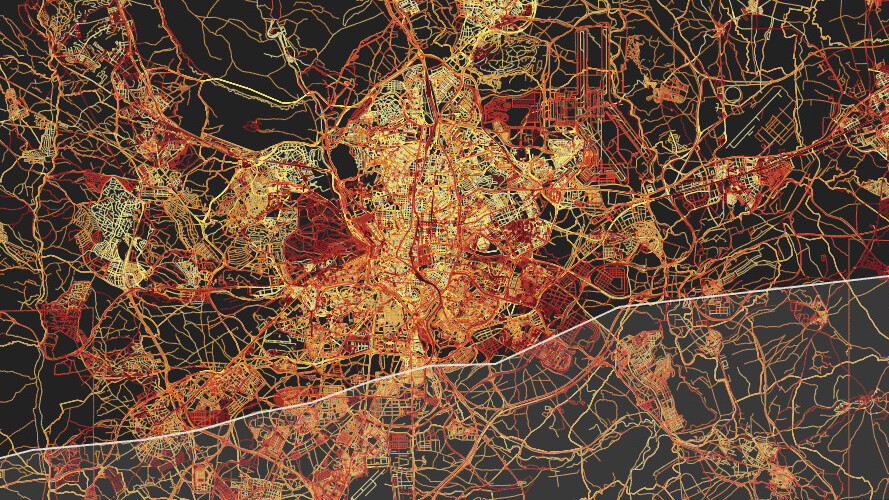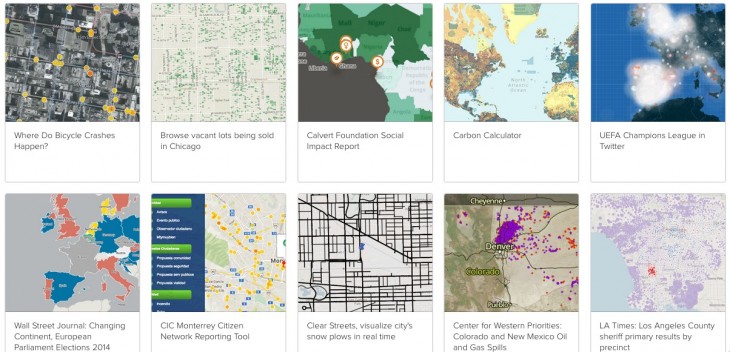
Freemium data mapping platform CartoDB now offers unlimited map views for all accounts.
In practical terms, this means that anyone can use the service for free to create data visualizations without having to anticipate how many clicks they’ll receive, as long as usage doesn’t exceed 50 MB of data. More advanced users can also choose to sign up to expand the data threshold.
As some of you may remember, CartoDB’s non-enterprise pricing tiers previously came with view limitations which meant that small users needed to keep close tabs on its map view quota calculator. While that model is very common for geographic information systems (GIS), CartoDB decided to shake things up:
 “We realized that charging for map views was actually penalizing you for creating interesting maps,” the company’s senior scientist Andrew Hill told users in a blog announcement. “We no longer want you to have to worry about unexpected traffic or what happens when the maps on your account go viral,” he added.
“We realized that charging for map views was actually penalizing you for creating interesting maps,” the company’s senior scientist Andrew Hill told users in a blog announcement. “We no longer want you to have to worry about unexpected traffic or what happens when the maps on your account go viral,” he added.
As a sign that CartoDB does hope that its users’ maps get widely shared, the former map view quota calculator has now been symbolically replaced by a friendlier “map view counter.” Its paid monthly plans also come with a 14-day free trial period.

A wide appeal
Unsurprisingly, CartoDB’s somewhat bold decision seemed to have received a warm reception from its community. More interestingly, some of the comments on Twitter give a notion of CartoDB’s appeal across a broad range of verticals, from journalism to academia:
Suspect a lot more journalists will start playing with @cartoDB now that they're no longer charging for map views http://t.co/k9agqoYoje
— Chad Skelton (@chadskelton) November 12, 2014
Great news for corpus-based discourse analysts & sociolinguists that #CartoDB is now offering unlimited map views.
— Robert Poole (@RobertEPoole) November 12, 2014
Tweets aside, browsing its map gallery quickly gives an idea of CartoDB’s scope:

This versatility results not only from CartoDB’s pricing, but also from its ease of use for non-developers, even when it comes to creating sophisticated visualizations. As we reported in July, its open source Odyssey.js tool means that people can create interactive maps in Markdown without knowing how to code.
Betting on the long tail…
I met with CartoDB’s founder and head of product Sergio Álvarez Leiva earlier this month at EmTech Spain, an event he was attending as one of 10 “Innovators under 35” distinguished by the Spanish language edition of the MIT Technology Review.
During our informal chat, he pointed out that CartoDB had been paying attention from the very beginning to those with limited financial means. For instance, it had more than once offered dedicated grants and discounts to user groups such as students, educators, startups and non-profits.
Still, CartoDB’s new pricing will be less intimidating than ever to newbies who are keen to dip their toes into data visualization. The company is aware that this means paying customers will only represent a small share of its user base: “Our business model is based on having a very extended ‘long tail’,” CEO Javier de la Torre told tech blog TICBeat in a recent interview (in Spanish).
… with the means to do so
Applying this business model to a cloud-based service obviously comes at a cost, but as you can imagine, CartoDB made sure it could afford it before taking the leap. Earlier this year, it secured an $8 million Series A funding round led by Earlybird Venture Capital, with follow-on investments from Kibo Ventures and Vitamina K.

More importantly, CartoDB was sustainable even without external investment, and it prides itself in having reached break-even almost upon launch. As a matter of fact, its service counts a growing number of corporate clients. As power users, they don’t hesitate to sign up for an enterprise plan “starting at US$7,188 per year” to get access to the platform’s most advanced features.
CartoDB is using this capital to steadily grow its team, both in Madrid and in New York, where it moved its headquarters to get closer to its biggest clients. Besides corporations, the startup has also been engaging with the city’s tech ecosystem – its latest EcoHack environment-focused hackathon simultaneously took place in the Big Apple and a few other cities.
New open basemaps
CartoDB’s latest efforts to democratize mapping tools are also a testament to the company’s ties to the open data world. The company’s other major announcement this month was the introduction of Positron and Dark Matter, two new basemap series that users can freely build upon.
The two series rely on open data published by OpenStreetMap and NaturalEarth. According to Álvarez Leiva, this could make them particularly attractive in regions such as Latin America, where collaborative, volunteer-based mapping platforms sometimes boast more granular data than their commercial competitors.
Both Positron and Dark Matter were co-created with SF-based design and tech studio Stamen, which specializes in maps and visualizations. Here is how they look:

The fact that these maps are so elegantly designed is not a detail: it is yet another building block towards CartoDB’s mission to helping anyone create data-rich, eye-pleasing maps, while making sure they go as viral as possible. It will now be extremely interesting to see what users will build with these new freebies.
Have you or are you planning to build maps with CartoDB? Feel free to drop links in the comments section.
Get the TNW newsletter
Get the most important tech news in your inbox each week.




